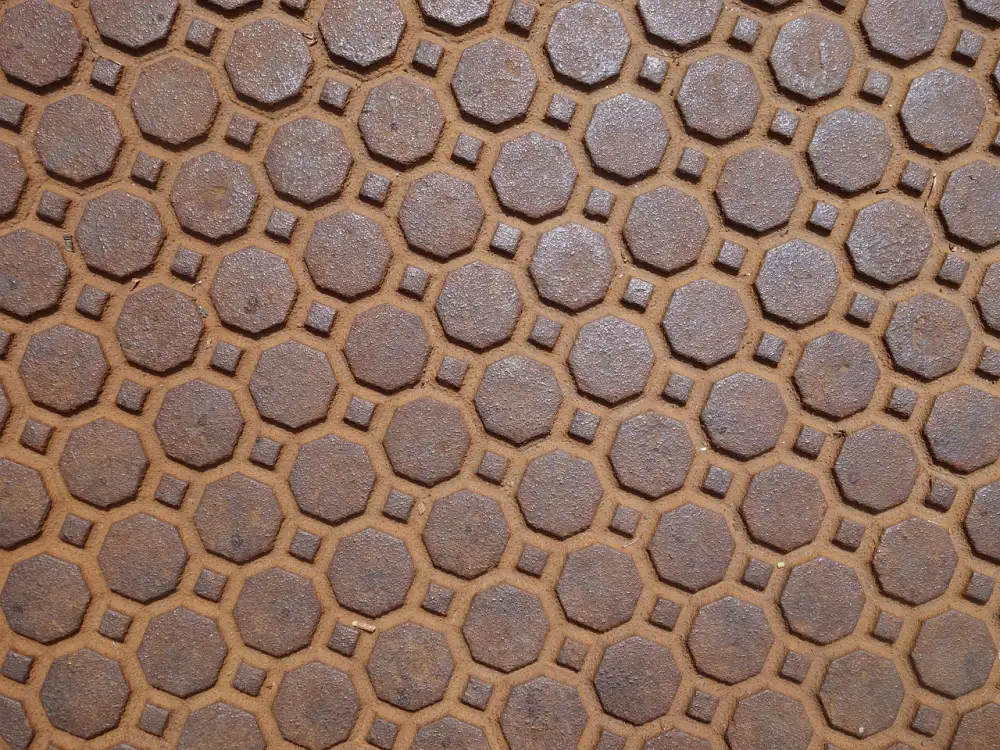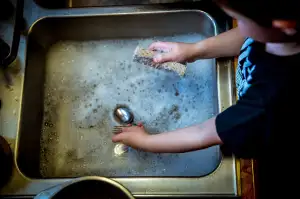Ultimate Guide to Cast Iron Skillet Cleaning: Keep Your Cookware Shining

- Gather necessary supplies: coarse salt, a sponge or stiff brush, dish soap, a towel, and vegetable oil.
- Allow the skillet to cool down before cleaning to prevent warping.
- Sprinkle coarse salt in the skillet to act as a gentle abrasive.
- Use a sponge or stiff brush to scrub the salt around the skillet, focusing on any stuck-on food.
- Rinse the skillet with hot water, avoiding using soap at this stage.
- Dry the skillet thoroughly with a towel to prevent rusting.
- Apply a thin layer of vegetable oil to the skillet to season it and prevent rust.
- Store the skillet in a dry place to maintain its seasoning and prevent rust buildup.
Gather necessary supplies: coarse salt, a sponge or stiff brush, dish soap, a towel, and vegetable oil.
To properly clean your cast iron skillet, it's essential to gather the necessary supplies beforehand. You will need coarse salt, a sponge or stiff brush, dish soap, a towel, and vegetable oil. These items will help you effectively remove any food residue while maintaining the skillet's seasoning. Having these supplies on hand will make the cleaning process much more efficient and ensure your cookware stays in top condition for years to come.
Allow the skillet to cool down before cleaning to prevent warping.
Allowing the cast iron skillet to cool down before cleaning is crucial to prevent warping. Sudden temperature changes can cause the metal to expand or contract rapidly, leading to warping or cracking. To avoid damaging your skillet, always wait for it to cool completely before starting the cleaning process. This simple step will help maintain the integrity of your cookware and ensure its longevity in your kitchen.
Sprinkle coarse salt in the skillet to act as a gentle abrasive.
Sprinkling coarse salt in your cast iron skillet is a simple yet effective way to act as a gentle abrasive during the cleaning process. The salt helps to loosen any stuck-on food particles without damaging the seasoning of the skillet. This method is preferred over using harsh chemicals or metal scouring pads, which can strip away the skillet's natural non-stick surface. The abrasiveness of the salt aids in lifting residue while being gentle enough to preserve the integrity of your cast iron cookware.
Use a sponge or stiff brush to scrub the salt around the skillet, focusing on any stuck-on food.
To effectively clean your cast iron skillet, use a sponge or stiff brush to scrub the coarse salt around the skillet, paying special attention to any stubborn, stuck-on food particles. The abrasiveness of the salt helps to lift off residue without damaging the skillet's seasoning. This step is crucial in ensuring that your skillet remains in top condition for cooking delicious meals.
Rinse the skillet with hot water, avoiding using soap at this stage.
After scrubbing the skillet with salt, it's time to rinse it with hot water. Avoid using soap at this stage as it can strip away the skillet's seasoning. The hot water will help remove any remaining food particles and salt residue without compromising the skillet's non-stick surface. Be sure to thoroughly rinse all areas of the skillet to ensure no salt is left behind. This step is crucial in maintaining the integrity of your cast iron skillet and preserving its natural non-stick properties.
Dry the skillet thoroughly with a towel to prevent rusting.
After rinsing the skillet with hot water, it's crucial to dry it thoroughly with a towel to prevent rusting. Any remaining moisture left on the cast iron can lead to rust formation over time. Ensure that all water droplets are completely removed from the surface and crevices of the skillet before proceeding to the next step of seasoning with vegetable oil. Properly drying the skillet is essential for maintaining its longevity and preventing any damage that may occur due to rust buildup.
Apply a thin layer of vegetable oil to the skillet to season it and prevent rust.
To season the cast iron skillet and prevent rust, apply a thin layer of vegetable oil to the entire surface, including the handle. Use a paper towel to spread the oil evenly, ensuring all areas are coated. The oil creates a protective barrier that helps maintain the skillet's non-stick surface and prevents moisture from causing rust. Heating the oiled skillet in an oven at 350°F for an hour can further enhance its seasoning by polymerizing the oil, creating a durable finish. Regularly seasoning your cast iron skillet will improve its performance and longevity.
Store the skillet in a dry place to maintain its seasoning and prevent rust buildup.
To ensure your cast iron skillet stays in top condition, it's crucial to store it properly. Store the skillet in a dry place to maintain its seasoning and prevent rust buildup. Moisture can lead to rusting, so make sure the skillet is completely dry before storing it. You can even place a paper towel inside the skillet to absorb any excess moisture. By storing your skillet in a dry environment, you'll help preserve its seasoned surface and extend its lifespan for many more delicious meals to come.
Published: 20. 04. 2024
Category: Home



